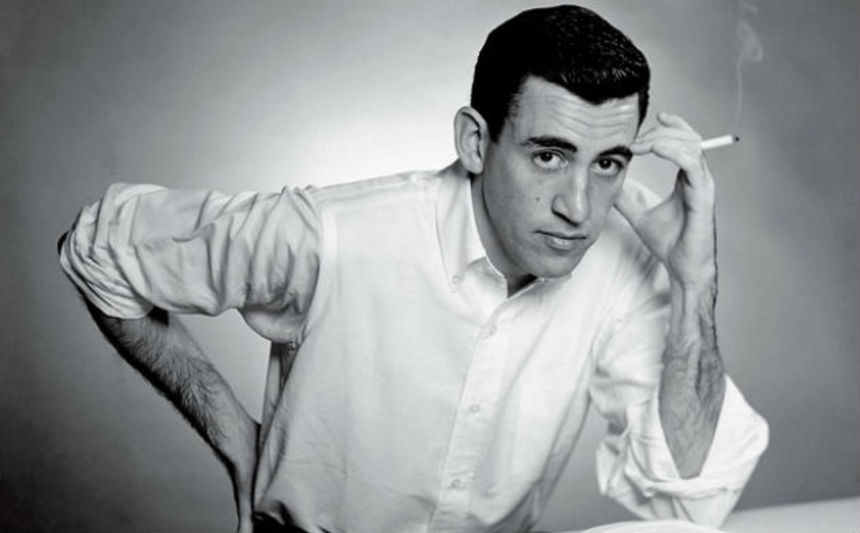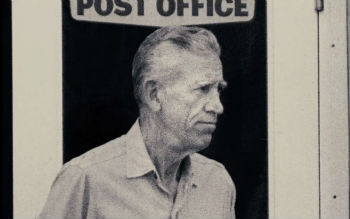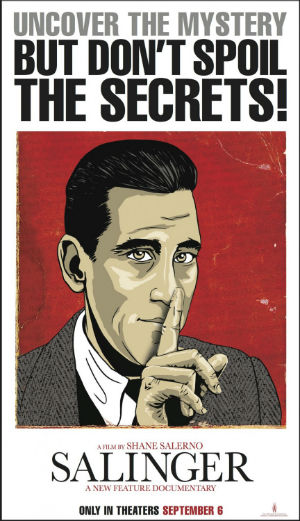Review: SALINGER Promises Secrets And Insights, Delivers Research And Interviews

Not content merely to be a sturdy, well-researched documentary that recounts the life and literature of J.D. Salinger, Shane Salerno's Salinger seeks to discover the secret psychological motivations of the writer, who famously guarded his privacy for decades after his first novel, The Catcher in the Rye, became a runaway success upon its publication in 1951.
Salerno works very hard to make the case that Salinger not only lost a great romantic love during World War II, but, more importantly, suffered from an extended, untreated case of post-traumatic stress disorder due to the horrors he saw in battle as a soldier, and that everything he wrote thereafter can be linked directly to his personal experiences. To that end, Salerno also indulges in frequent use of dramatic recreations to fill in the portions of Salinger's life that he endeavored to keep private.
The net effect is a split decision.
The film starts off on the wrong foot, dramatizing the story of a photographer who snapped the first picture of Salinger in many years, giving the impression that paparazzi-style stalking is a praiseworthy style of journalism. It recovers by then placing the bricks of Salinger's early life in order, establishing a solid foundation for the speculation to come. Brief details of his upbringing as an advantaged child in Manhattan, attendance at a military academy, and his burning desire to be a writer are all laid out nicely, supported by photographic evidence and interviews with some who knew him.
 Then an odd fast-forward to 1978, and an extended interview with a worshipful 40-year-old fan, who surprised Salinger outside his home and requested / demanded an audience with him. Then a return to the pre-war years and the stirrings of a romantic relationship with a young woman. The breakup of that relationship during the war is said to have deeply affected Salinger, coupled with his extended military service in combat in the European war zone, leading to what's described as a nervous breakdown. He reenlisted in the military, served as a war crimes investigator, and returned to New York City. His stories began to receive greater notice after the war, culminating in the publication of The Catcher in the Rye, after multiple rejections.
Then an odd fast-forward to 1978, and an extended interview with a worshipful 40-year-old fan, who surprised Salinger outside his home and requested / demanded an audience with him. Then a return to the pre-war years and the stirrings of a romantic relationship with a young woman. The breakup of that relationship during the war is said to have deeply affected Salinger, coupled with his extended military service in combat in the European war zone, leading to what's described as a nervous breakdown. He reenlisted in the military, served as a war crimes investigator, and returned to New York City. His stories began to receive greater notice after the war, culminating in the publication of The Catcher in the Rye, after multiple rejections.
These were the turning points in Salinger's life, we are told. He was a friendly, if intense, young man before the war, but afterward he was broken, looking for comfort in the company of teenage girls. His fiction reflected his increasingly insular life. He disliked the attention that fame brought to him, and he shied away from it, and then resisted it entirely, becoming a bit of a hermit on his property in New Hampshire. He stopped submitting his work for publication in 1965, but continued writing.
As far as it goes in providing a biographical portrait of a writer's life, Salinger is steady and sure. Where it goes off-track is in all the other material, including an extended interview with Jean Miller, who was 14 when she met the 30-year-old Salinger, and details the excessive attention he paid to her over the course of years, which led to a romantic and (briefly) sexual relationship. At the very least, Salinger's attention to a string of young girls is discomfiting; at worst, it paints him as a damaged individual who, in turn, damaged others.
But Salinger is less interested in that than in proving a correspondency between real life and fiction. This is a very shaky premise, depending on the hypothesis that all fiction is no more than real life with the names changed, as though writers have no imagination at all. It's insulting on the face of it to anyone who has created a work of fiction, and quite surprising coming from Salerno, a writer himself.
 On the other hand, it could be a manifestation of the same type of extreme fandom that drove people to travel hundreds of miles for the opportunity to confront "the great man," who only wanted to be left alone so he could write. Salerno devoted years of his life to an intense study of the man and his work, and, after all that time, of course he has his own theories as to what drove Salinger. Yet much of what is presented is pure speculation, along the lines of someone declaring, 'This is what I think, and I've given it a lot of thought, so it must be true, because I say so.'
On the other hand, it could be a manifestation of the same type of extreme fandom that drove people to travel hundreds of miles for the opportunity to confront "the great man," who only wanted to be left alone so he could write. Salerno devoted years of his life to an intense study of the man and his work, and, after all that time, of course he has his own theories as to what drove Salinger. Yet much of what is presented is pure speculation, along the lines of someone declaring, 'This is what I think, and I've given it a lot of thought, so it must be true, because I say so.'
The dizzying array of interview subjects is impressive, even when some of them spin way off-topic, and Salerno sometimes works too hard to emphasize THE IMPORTANCE of what someone is saying, as when he ping pongs from one interview with Joyce Maynard -- a writer who had a relationship with Salinger when she was quite young in the 70s -- to another interview with her, in which she is apparently saying the exact same thing as in the other interview.
Those kind of effects are needless distractions. The wealth of research and interviews in Salinger certainly make it worth a watch for anyone who has been touched by The Catcher in the Rye -- or anyone who wonders what all the fuss is about -- even if it doesn't make as convincing a case for "uncovering" all the secrets that it thinks it does.
Salinger screens tonight at the Toronto International Film Festival. It opens in select theaters in the U.S. on Friday, September 6, before expanding in the coming weeks. Visit the official site for more information.







